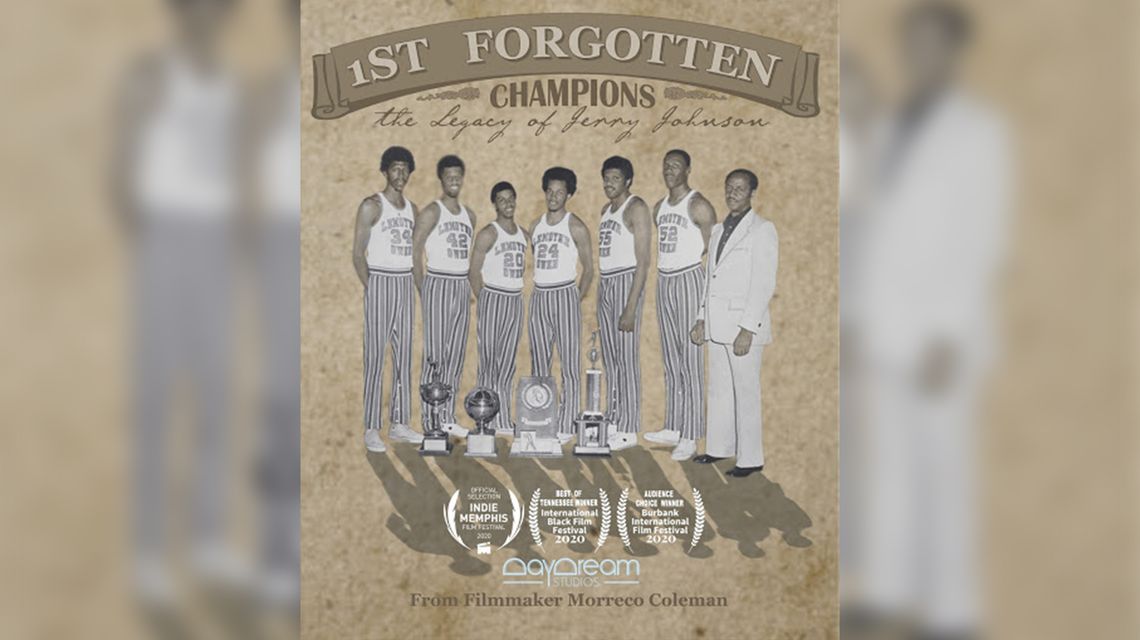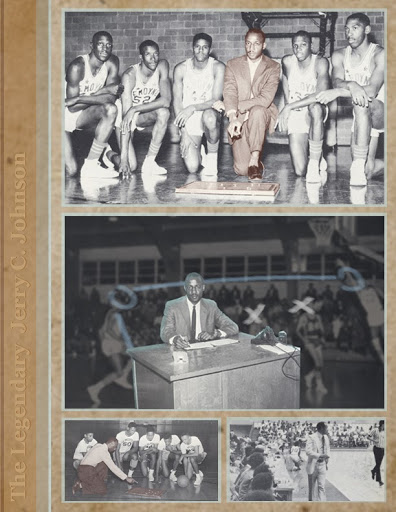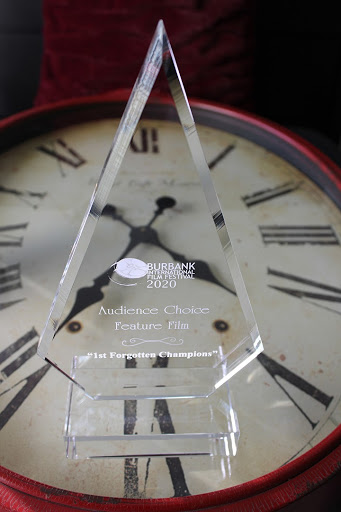
New documentary ‘1st Forgotten Champions’ highlights legendary basketball coach Jerry Johnson
MEMPHIS, Tenn. (BVM) — Former Lemoyne-Owen College men’s basketball coach Jerry Johnson had the basketball experience that one could write a movie script about. And that’s sort of what filmmaker Morreco Coleman did in his latest project, “1st Forgotten Champions” which describes the life and successes of Johnson during his time leading the Magicians. While the movie does not need a script, being a documentary, having the story told by the 102-year-old coach himself as well as other Memphis basketball legends such as former Tigers player Penny Hardaway and former Memphis basketball coach John Calipari may be better than anybody could write anyway.
“Coach Johnson’s story is great in itself, you don’t necessarily need other role players,” Coleman said. “That just shows you how important Jerry Johnson was for them, not only just for this film. It wasn’t really hard to get them outside of scheduling. … They were ready.”
For the Memphis-native Coleman, who grew up surrounded by the city’s basketball scene, being able to learn more about Johnson, his accomplishments and his life was eye-opening.
“Coach Johnson is a legendary coach, he’s a legend in Memphis so I think it was an honor to just jump at the opportunity to work on it,” Coleman said. “Once you go through his accolades and all the articles, he is leaving a legacy behind. Hopefully people can watch the movie and follow suit and make the world a better place to live.”
Johnson’s impact is far reaching beyond even the boundaries of Lemoyne-Owen and the city of Memphis. Johnson began coaching the Magicians in 1959, but he received most of his coaching lessons from John McClendon. McClendon is known for being the first African American basketball coach at a predominantly European-American university and the first African American head coach in any professional sport who learned directly under the tutelage of James Naismith who is regarded as the founder of basketball.
“Throughout the movie [Johnson] mentions over and over in time who taught him,” Coleman said. “That’s important. That’s vital to telling a story.”
Johnson would coach the Magicians for 46 years until his retirement from the program in 2005 at the age of 85. The coach would earn a number of significant accomplishments over his many years at the helm, racking up 821 career victories (just one of a handful to ever win over 800 games in the NCAA), half a dozen conference coach of the year awards and numerous conference championships. But chief among Johnson’s accomplishments was winning the 1975 NCAA Division III national championship, becoming the first African American to do so and making Lemoyne-Owen the first HBCU to ever win the championship.

This is at the crux of Coleman’s film. The significance of Johnson becoming the first African American to win the Division III title is huge in the city of Memphis and even in the state of Tennessee, but it is not well known throughout the country. For a man to have not only achieved that significant milestone but to continue coaching for another 30 years after, it is a surprise more people don’t know about his contributions to the sport of basketball. That was also the inspiration for the film’s title.
“If you’re not a true basketball fan or alumnus from Lemoyne-Owen, there’s a good chance you don’t know this,” Coleman said. “We just wanted to bring awareness to the city and they celebrate Jerry Johnson, but there’s just not enough. Hopefully this movie can bring a broader view to the fans.”
Although he retired in 2005, Johnson and coaching ability is still fondly remembered by those in the Lemoyne-Owen Community as well as the city of Memphis as a whole. Upon his retirement in 2015, the Memphis City Council named “Jerry C. Johnson” street and he received the keys to the City of Memphis and Lemoyne Owen College. In June of 2005, he was given a Lifetime Achievement Award by the City of Memphis. On June 16, 2012, Tennessee Governor Bill Haslam declared the date to be Coach Jerry C. Johnson Day and celebrations included Lemoyne-Owen renaming their gymnasium in Johnson’s honor.
“The gym was a great addition to his celebrity status and his basketball legacy,” Coleman said. “It’s the same gym that was there when he decided to move to Memphis and coach so the history and the architecture of the building is the same. I think adding Jerry Johnson is pretty good.”
Johnson’s legacy reaches beyond just the total wins or the championships as well, as shown through the film. A number of players Johnson has coached have also made significant impacts in their career fields as well. During his career he coached eight NBA players, numerous high school or junior high school coaches, college coaches, high school principals, a city councilman, and Dr. Willie Herenton, the first elected African American Mayor of Memphis.
Although at the ripe age of 102, Johnson shows he still has a keen memory as he recollects his experiences as a head coach for the audience. While his story may not be well-known around the country quite yet, it will be soon thanks to the effort given by Coleman and the rest of his filmmaking crew.

So far, the film has been making its way through a number of different film festivals including the Burbank International Film Festival where it won the audience choice award and the International Black Film Festival in Nashville, Tenn. where it won the Best of Tennessee. Though the awards are nice, Coleman doesn’t hang his hat on them too much.
“To me, the accolades and awards is not my key principle,” Coleman said. “I just want to tell a great story and the next time tell a better story, but I think we did really well.”
The most recent film festival the movie made its appearance was the Indie Memphis Film Festival, bringing Johnson’s story back home. While there were a number of different films being shown during the virtual event, the NBA’s Memphis Grizzlies chose to sponsor the film and planners actually set up an outdoor viewing of the film for Memphians to enjoy it on the big screen, making the movie stand out from some others.
“That’s an award within itself,” Coleman said. “Memphis went above and beyond in addition with the outdoor filming. The Memphis Indie Film Festival was really fun and I got a chance to go home and visit and check it out in person.”
Coleman’s film is about more than just a team, more than just a national championship. It’s about a coach who went above and beyond for his players, his school and his community and his far-reaching impact on the city of Memphis as a whole.
“It’s bigger than just basketball,” Coleman said. “It’s bigger than just entertaining people. It’s about getting down to the core of things. This story is not so much about basketball, but it’s about accomplishing a goal. … For coach Johnson it was a 57 year goal. It took him 57 years to win a championship and we need to understand that we have to remove time from a lot of the equation when it comes to setting a goal.”





